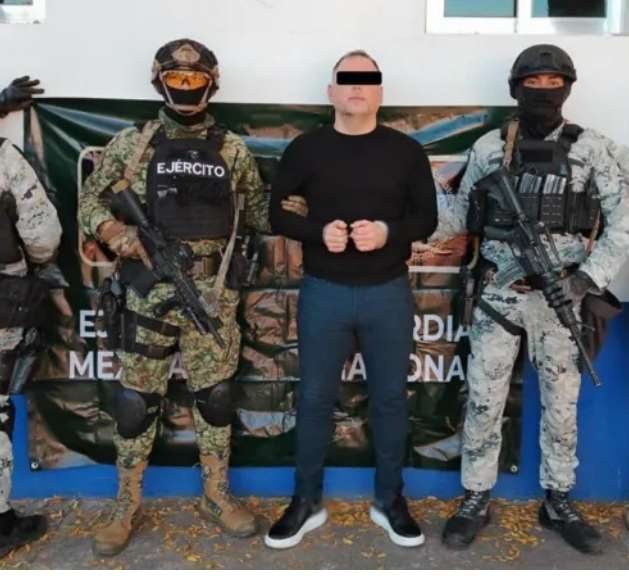Mexican Authorities Apprehend High-Ranking Cartel Operative.
The arrest of José Ángel Canobbio, alias “El Güerito,” in Culiacán, Sinaloa, marks a significant victory for Mexican authorities in their ongoing battle against the Sinaloa Cartel. Canobbio, a high-ranking member and head of security for Iván Archivaldo Guzmán, son of the infamous Joaquín “El Chapo” Guzmán, played a crucial role within the cartel’s hierarchy. His capture disrupts the organization’s security apparatus and potentially weakens the leadership structure surrounding Iván Archivaldo Guzmán. This arrest comes as a direct response to mounting pressure from the United States, demanding stronger action against Mexican drug cartels and their involvement in the fentanyl crisis. It signals a renewed commitment by the Mexican government to combat drug trafficking and demonstrates a willingness to target key figures within powerful criminal organizations.
The timing of Canobbio’s arrest, shortly after the U.S. officially designated the Sinaloa Cartel as a foreign terrorist organization (FTO), underscores the escalating tension between the two countries regarding drug trafficking and its devastating consequences. The FTO designation, a controversial move by the U.S., grants American authorities broader powers to pursue the cartel’s assets and members, potentially impacting their financial operations and international networks. Along with the Sinaloa Cartel, seven other Latin American criminal groups were added to the FTO list, including the Jalisco New Generation Cartel (CJNG), the Gulf Cartel, the Northeast Cartel, the United Cartel, the New Michoacán Family, Tren de Aragua, and MS-13. This sweeping designation reflects the U.S. government’s increasingly aggressive stance against transnational organized crime and its determination to disrupt the flow of illicit drugs, particularly fentanyl, across the border.
The fentanyl crisis has become a focal point in U.S.-Mexico relations, with the U.S. government attributing a significant portion of overdose deaths to fentanyl trafficked from Mexico. The U.S. has been pressing Mexico to intensify its efforts against cartel activities related to fentanyl production and distribution. The recent agreement between Mexican President Claudia Sheinbaum and the U.S. to delay a 25% tariff on Mexican imports provides some breathing room for the Mexican government to demonstrate its commitment to combating drug trafficking. Canobbio’s arrest serves as a tangible example of this commitment, potentially influencing future collaborations and negotiations between the two nations.
Canobbio’s involvement in the cartel’s fentanyl operations further highlights the significance of his capture. Indicted in the U.S. last November for fentanyl smuggling, Canobbio is believed to have played a major role in the cartel’s production and distribution network for the deadly synthetic opioid. Security expert David Saucedo emphasizes Canobbio’s crucial role in the cartel’s fentanyl operations, suggesting that his arrest will significantly disrupt the flow of the drug and potentially lead to the identification of other key figures involved in its trafficking. This development could have far-reaching consequences for the cartel’s ability to produce and distribute fentanyl, impacting both the supply chain and the international market.
The arrest of Canobbio and the subsequent FTO designations mark a significant escalation in the fight against drug trafficking in the region. The U.S. government’s aggressive approach, coupled with the Mexican government’s renewed efforts to combat cartels, signifies a shift in the dynamics of the drug war. The effectiveness of these measures remains to be seen, but they represent a concerted attempt to disrupt the operations of powerful criminal organizations and address the devastating consequences of the fentanyl crisis. The potential extradition of Canobbio to the U.S. could further expose the inner workings of the Sinaloa Cartel and provide valuable intelligence to law enforcement agencies.
The future of U.S.-Mexico cooperation in combating drug trafficking hinges on the continued commitment of both governments to address the root causes of the problem and dismantle the powerful criminal networks responsible for the production and distribution of illicit drugs. The arrest of José Ángel Canobbio is a crucial step in this ongoing battle, but it represents just one piece of a complex puzzle. Sustained efforts, including intelligence sharing, joint operations, and targeted interventions, will be necessary to effectively combat the deeply entrenched networks of drug trafficking and stem the flow of fentanyl into the United States. Only through continued collaboration and a comprehensive approach can both nations hope to make significant progress in this protracted struggle.
Share this content:












Post Comment